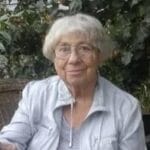
Klara Yaroshevskaya (Ukraine)
June 22, 1941, was sunny morning in the city of Zhitomir. I was 12 years old at the time. That day we heard Levitan’s voice on the radio: “From the Soviet Information Bureau …” The war had begun.[1]
On the second day of the war we saw a fascist aircraft dropping bombs. Our neighbors built a shelter in the courtyard by digging a hole and fashioning a roof out of boards. When the air raid alarm sounded, we would descend into this shelter along with all of our neighbors. When the courtyard was illuminated by floodlights, we would hide in our cellar.
We wanted to leave, but it was dangerous to go to the rail station. One neighbor girl returned from the station alone; her entire family had been killed there during a bombing.
The Germans bombed the entire night on July 4, so early the next morning we decided to go to the rail station. We only had a small suitcase with us. Most of our belongings, photos, and even some documents were left behind and lost forever. Refugees at the station were loaded into rail cars for cattle (without a roof), but the trains didn’t move all that day. We watched as airplanes battled overhead, hoping that our pilots would shoot down the fascists.
The train finally left at about 6 pm, but just 18 kilometers later three fascist aircraft appeared. We thought they were flying past, but then they turned. We all jumped from the train and ran into fields and the woods. We ran into a field. The fascists dropped bombs in the woods and strafed the fields. One bullet ricocheted and hit me in the knee (a glancing blow which missed the bone and healed quickly). The airplanes left, and we boarded the train again. A terrible night awaited us.
The train stopped again near a village, where someone told us in broken Ukrainian (pretending to be German) that we had to get off the train, presumably so that they could rob the train. We heard shouting and shots. People started to run, and in the distance there was a fence that some threw their children over in order to save them. This horror lasted a couple of hours, but then the train moved on, this time to Poltava. We were dropped off at the station there and stayed in some train cars. They moved us eventually to another cattle car in a train that went to Kharkov. We had to drink swamp water along the way. Our legs began to swell horribly.
In Kharkov, we went to see my cousin. Other refugees joined us (our group was about 19 people). They decided to entertain the children, taking them to a park, but the air raid sirens went off. The fascists aircraft were in the skies over Kharkov.
From Kharkov we traveled at first by train, then on a steamer headed for Bashkiria. We arrived in the evening to the Tatar village of Kurmashovo, where 30 of us settled in a small house. All four walls of the house had windows, and local people looked at us through the windows, weeping. We really looked miserable: we had no belongings, were hungry, and the children were crying. The locals didn’t speak Russian. The next day we were transported to the Russian village of Baskakovo, where two families settled in one house that had just one large room partitioned in half so each family could have a separate room.
All the adults, including my 15-year-old sister, worked on the collective farm. I led the entire household; I cleaned, carried water from the well, cooked, washed clothes and other things in the lake. I also went to school. During the winter we collected firewood in the forest to warm up the school. My mother, who was a pharmacist, organized a kindergarten and day nursery. One day I went to visit, and the children were being fed a grated carrot with cream. The nurse also treated me, for which I received a reprimand from my principle-minded mother. My mother was loved by all the parents.
All the workers were paid in grain rather than money. My sister and I went to the mill (five kilometers from the house) and turned the wheel to grind the grain. It was very difficult, but it kept us from starvation for a while.
There were no classes available in the village for senior students. My sister passed her external examinations, and we moved to another village, Kushnarenkovo. There we planted potatoes and the harvest was very good. We cooked soup (“ushka,” made with potatoes and fried onions), and “Mamaliga” (the so-called liquid porridge made from ground peas). I went to school, and in the summer I worked at a state farm, at an experimental station.
We worked at weeding the farm (I really didn’t like this, preferring to carry water) and harvested vegetables and berries. We listened constantly to radio broadcasts about the events at the front, and sent letters and parcels to front-line soldiers. In October 1944, we returned home to Zhitomir, arriving in a city in ruins. We soon learned the fate of those relatives who did not leave. They’d all been killed.
I remember Victory Day, May 9, 1945. The people took to the streets, embracing, kissing, and dancing.
I graduated from school and entered the University of Kiev to study in the Mechanics and Mathematics department. I met my future husband there, the father of my daughters. My husband went to war right after his graduation ceremony in June 1941, when he was 18. He survived the war and returned home with awards and medals.
[1] Yuri Levitan was the famous voice of “Radio Moscow” during and after World War II. Levitan’s reports always began with his trademark phrase: “Attention, this is Moscow speaking!” Levitan was Jewish.
